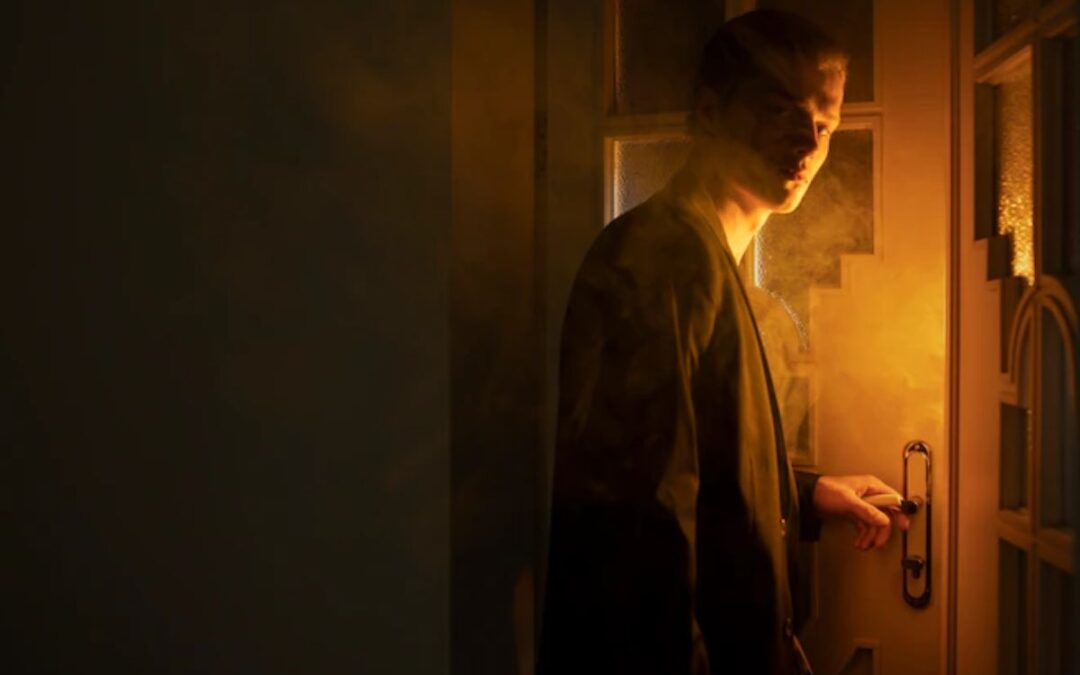Escape rooms are all the rage, but are you too scared to try one? Fear not! In this article, we’ll teach you how to overcome your fear and become an escape room pro.
Ready? Let’s go!
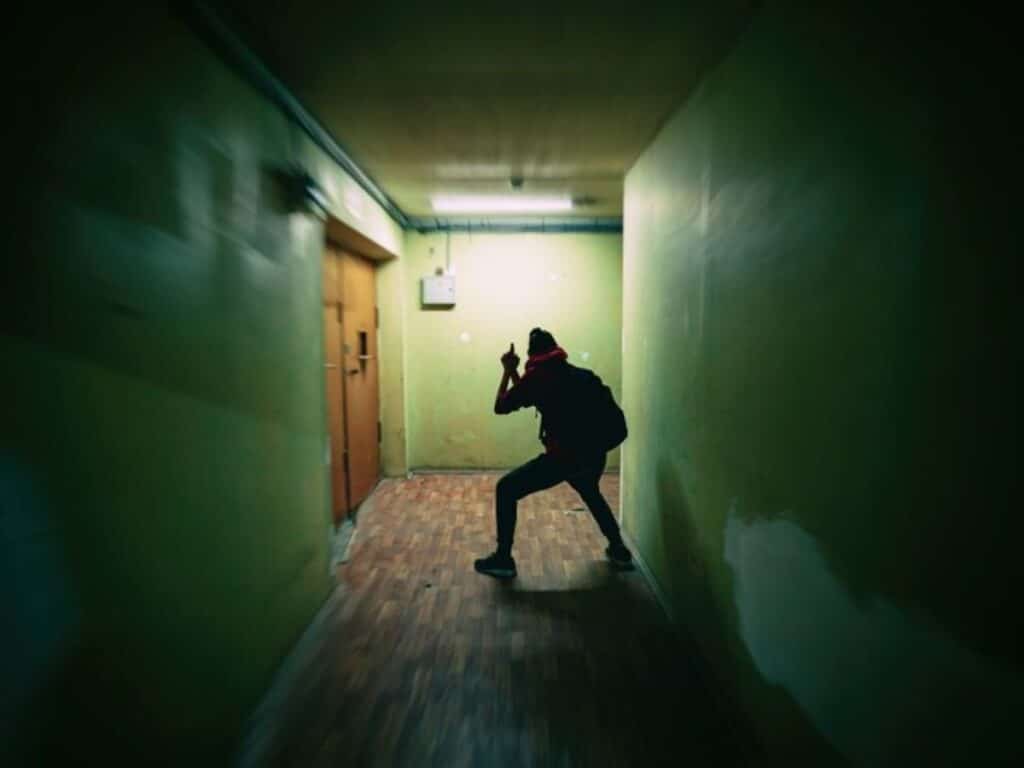
Escape rooms are immersive, live-action games where you and your team are “locked” in a themed room and must solve a series of puzzles and challenges to “escape” within a set time limit. It’s an adrenaline-pumping, exhilarating, and downright addictive experience!
But what is the PURPOSE of an escape room game?
Benefits of Participating in an Escape Room
Participating in escape rooms is all fun and blasts, but they also offer some serious benefits!
- Enhances problem-solving and critical-thinking skills
- Encourages teamwork and communication
- Boosts self-confidence and self-esteem
- Provides a fun and unique bonding and entertaining experience
- Face your fears and anxieties to overcome challenges
But sometimes fear can hold us back from enjoying these benefits.
Why escape rooms make the ultimate team building activity.
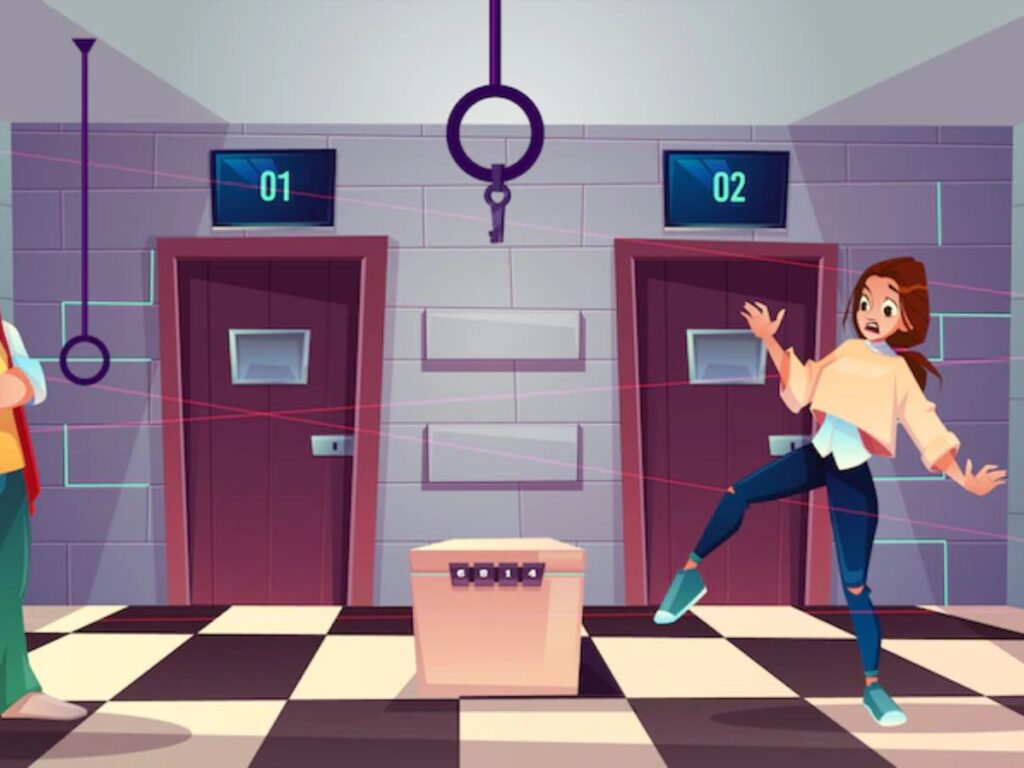
The Problem of Fear in Participating in Escape Rooms
For some, the idea of being “locked” in a room and solving puzzles under pressure can be terrifying. You are NOT actually locked in a room!
For others, it might be claustrophobia, fear of failure, social anxiety or the theme of the room.
Read below as we dissect the fear factor and stress on the stress that is simply on your mind.
The Psychology of Fear
Fear is a natural response to a perceived threat, and it can help keep us safe in dangerous situations. But sometimes, our fears can get the better, holding us back from enjoying new experiences.
The Difference Between Fear and Anxiety
While FEAR is an immediate emotional response to a perceived threat or danger, ANXIETY, on the other hand, is a more general and persistent feeling of unease, worry, or apprehension about a future event or situation.
In an escape room, fear can manifest as –
- A sudden, intense reaction to a specific stimulus or situation
- A short-lived response that subsides once the perceived threat is removed or resolved
- A protective mechanism that prompts a fight-or-flight response to help the individual escape the perceived danger
In an escape room, anxiety can manifest as –
- A lingering sense of unease or nervousness throughout the experience
- Persistent worry about various aspects of the escape room, such as time limits, puzzles, or team dynamics
- A tendency to overthink or catastrophize potential outcomes, making it difficult to focus on solving the puzzles
The Types of Fear That Can Be Associated with Escape Rooms
Various types of fear can be associated with escape rooms, depending on the individual’s personality, past experiences, and the specific elements of the escape room itself.
Some common fears related to escape rooms include –
- Claustrophobia
The fear of enclosed spaces can be triggered in escape rooms, as they often involve confined or locked spaces. Participants who experience claustrophobia may feel panicked, trapped, or unable to breathe in such environments.
- Fear of failure or embarrassment
The competitive nature of escape rooms and the pressure to solve puzzles within a time limit can evoke the fear of failure (atychiphobia). Participants might worry about disappointing their teammates or feeling embarrassed if they cannot contribute effectively.
- Fear of the dark or unknown
Many escape rooms incorporate dim lighting or complete darkness in their design, which can be unsettling for individuals who fear the dark (nyctophobia). This fear can intensify feelings of vulnerability or disorientation in the escape room.
- Fear of getting stuck or trapped
The fear of getting stuck or trapped in an escape room refers to the apprehension of being unable to solve puzzles or exit the room, resulting in feelings of confinement or helplessness.
- Social anxiety
Escape rooms require teamwork, collaboration, and communication, which can be challenging for those with social anxiety (social phobia). These individuals may fear being judged, criticized, or excluded by their teammates.
- Fear of heights
Some escape rooms may include elements that involve climbing, crawling, or navigating high spaces. Individuals with a fear of heights (acrophobia) might experience dizziness, vertigo, or panic in these situations.
- Fear of specific themes
Escape rooms have various themes, some of which might be frightening or intense for certain individuals. For example, rooms with horror, crime, or supernatural themes might trigger fear in those who are sensitive to such content.
- Fear of separation
In some escape rooms, participants may be separated from their teammates, triggering separation anxiety or fear of being alone (autophobia).
- Fear of loud noises
Escape rooms may feature sudden, loud noises or sound effects, which can be distressing for individuals who fear loud noises (phonophobia).
The ultimate guide to family friendly escape rooms.
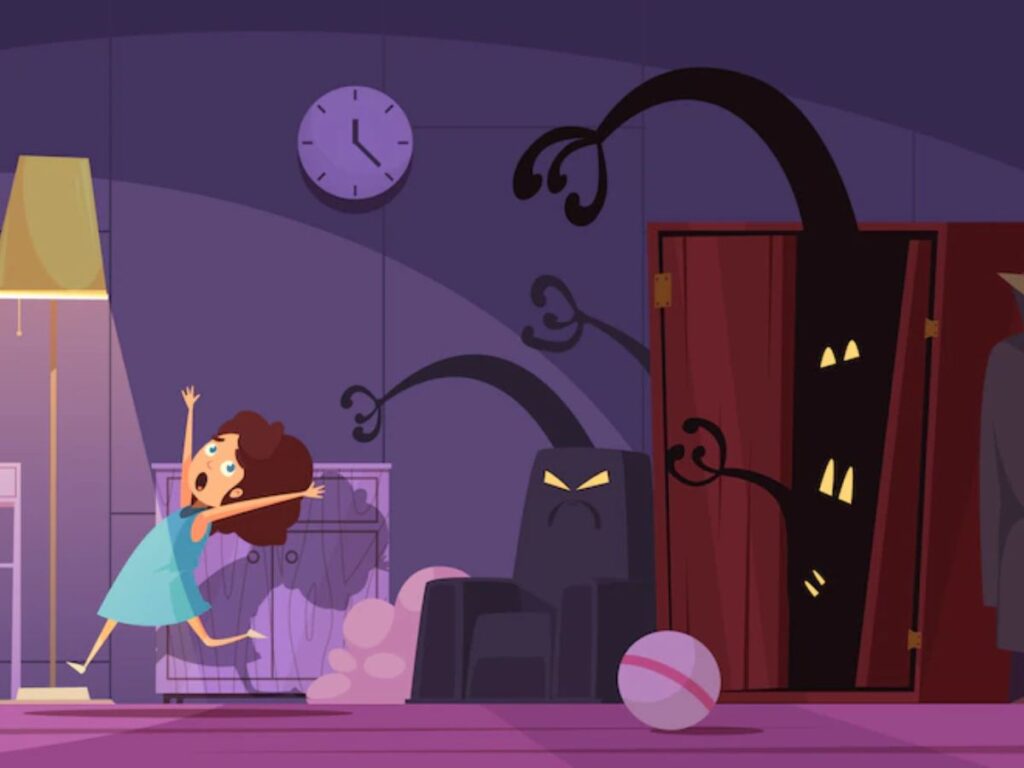
Identifying the Root Cause of Fear
The root causes of fear in individuals can be complex and varied, depending on each person’s unique experiences, personality, and circumstances. However, some common root causes of fear include –
Evolutionary Factors
Fear is a natural and adaptive response that has evolved to help humans identify and avoid threats or dangers. This survival mechanism is hardwired into our brains, and certain fears, such as the fear of heights, snakes, or spiders, may have evolutionary origins.
Past Experiences & Trauma
Past experiences can play a big role in shaping our fears. Maybe you’ve had a bad experience in an escape room or a similar situation that’s left you feeling apprehensive.
Learned Behavior
Fear can also be learned from observing others, such as parents or peers, reacting fearfully in specific situations. For instance, a child might fear spiders after witnessing their parent’s fearful reaction to spiders.
Personality Traits
Some people have a genetic predisposition or personality traits, such as high levels of neuroticism or sensitivity, that make them more prone to developing fear or anxiety.
Cultural & Social Influences
Our upbringing and cultural background can also impact our fears. For example, some cultures or societies might place a higher value on success or avoid situations that could lead to embarrassment.
Conditioning
Classical conditioning can play a role in the development of fear. When a neutral stimulus (e.g., a specific location) is repeatedly paired with an aversive event (e.g., a traumatic experience), the individual may develop a fear response to the neutral stimulus over time.
Media Representations
Movies, TV shows, and news stories can shape our perceptions of escape rooms and contribute to fear. Remember, though, that these representations are often exaggerated for dramatic effect.
Medical Or Neurological Factors
In some cases, fear or anxiety may be linked to an underlying medical condition, such as hormonal imbalances, thyroid disorders, or neurological issues.
Hangouts in Hyderabad for friends and colleagues.

Strategies for Overcoming Fear – How Do I Get Over My Fear Of Escape Room?
Once you have identified the root cause of fear, it is essential to develop effective coping strategies and address the concerns.
Here are some strategies to overcome your fear and have a fun escape room experience –
Familiarize Yourself with the Escape Room Concept
Knowledge is power! The more you understand about escape rooms, the less intimidating they become. Read up on the rules, watch videos, or even visit a local escape room to get a feel for the atmosphere.
Analyze Underlying Beliefs
Examine your beliefs and thought patterns related to their fear. Are you holding onto irrational or distorted beliefs about yourselves or the world around you? Challenging and restructuring these beliefs can help address the root cause of fear.
Practice with Smaller Puzzles or Games
Start small to build your confidence. Try puzzle books, apps, or board games that involve problem-solving and teamwork.
Participate with a Supportive Group
Surround yourself with friends or family who encourage and support you. They’ll help you feel more comfortable and confident in the escape room.
Communicate with the Game Master
Escape room staff members are there to help! Don’t hesitate to ask questions or express any concerns you may have.
Focus on the Fun and Experience Rather Than Winning
Escape rooms are meant to be enjoyed! Instead of obsessing over winning, focus on having a good time and creating lasting memories with your team. You might be surprised at how much more enjoyable the experience becomes.
Rule Out Medical Causes
In some cases, fear or anxiety may have a physiological cause, such as a hormonal imbalance or a neurological condition. Consult a healthcare professional to rule out any underlying medical issues that may be contributing to the fear.
If you’re still scared of escape rooms, don’t stress. Check out our article about other fun and creative options instead of escape rooms.
Team outing resorts in Hyderabad.
Additional Tips for Success
- Arrive Early
Give yourself ample time to settle, sign any necessary waivers, and receive a briefing on the rules. This will help you feel more relaxed and prepared.
- Wear Comfortable Clothing
Dress for success by wearing clothes that allow you to move freely and feel at ease. You might need to crawl, climb, or reach for clues, so ensure your outfit is up to the task!
- Use the Restroom Beforehand
You don’t want to be stuck in an escape room with a full bladder. Trust us on this one! Drink water and use the restroom beforehand so you don’t have to go during the game.
- Eat a Light Meal
You’ll need energy and a clear mind to solve puzzles, so make sure you’ve had a nutritious meal beforehand. But don’t overdo it – a food coma won’t help your chances of escaping!
- Stay Hydrated
Dehydration can impact your cognitive abilities, so drink plenty of water before and after your escape room adventure.
- Focus on the Puzzle at Hand Rather Than Potential Negative Outcomes
Worrying about “what ifs” can be a major distraction. Keep your mind on the task at hand and work together with your team to tackle each challenge.
- Be Willing to Ask Questions and Seek Help When Necessary
There’s no shame in asking for help! Remember, the game master is there to assist you. If you’re feeling stuck, don’t hesitate to reach out.
- Take Timeouts If Needed
Feeling overwhelmed? It’s okay to step back and take a breather. Just remember to communicate with your team and let them know you need a moment.
More adventurous activities in Hyderabad.
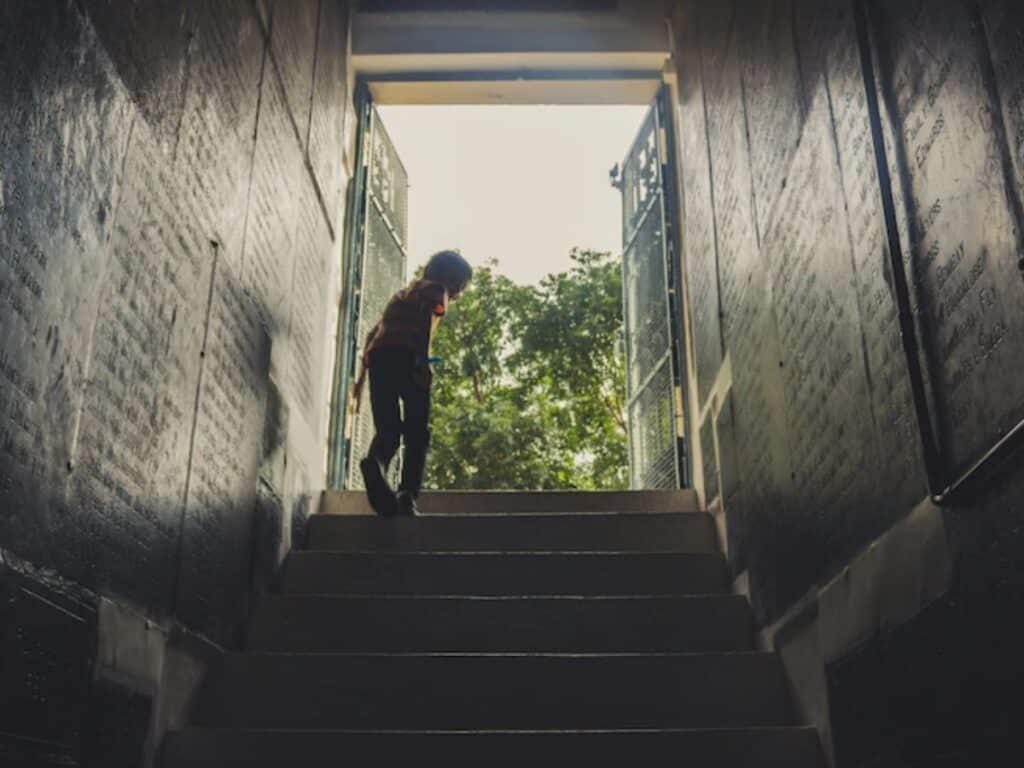
So there you have it – a comprehensive guide to overcoming your fear of escape rooms and setting yourself up for success. Remember, facing your fears can be incredibly empowering, and escape rooms offer a fun and supportive environment to do so.
As discussed, participating in escape rooms can improve problem-solving skills, encourage teamwork, and boost self-confidence. By facing your fears and embracing the challenge, you’ll have a fantastic time and reap the rewards of personal growth.
Now, what are you waiting for? It’s time to conquer your fears and dive into the thrilling world of escape rooms! Lock N Escape awaits – are you ready?
Cheers!
FREQUENTLY ASKED QUESTIONS
What do you do when you panic in an escape room?
Take a deep breath, amigo! Remember, it’s just a game. Communicate with your teammates, and let them know you’re feeling overwhelmed. They’re there to support you. And hey, a little humour never hurt, so try cracking a joke to lighten the mood!
And if you feel very panicked or overwhelmed, show the time-out gesture to the camera inside, and the game master will immediately come to help and get you out. Remember you are not trapped, and the doors may be locked, but you can leave the game room if needed. All our games are monitored, and game masters are there to help in case of any help/emergency.
How do you stay calm in an escape room?
Focus on the task at hand and remind yourself that it’s all make-believe. Encourage teamwork and celebrate small victories. Breathing exercises can also help.
What happens if you panic in an escape room?
Most escape rooms have a game master who monitors the room. They’ll step in to help or end the game early if you’re panicking. Safety comes first, after all.
Are doors locked in escape rooms?
Nope! Most escape rooms keep the entrance door unlocked for safety reasons. So, no need to feel trapped!
Do escape rooms lock you in?
All doors are locked, but there is always a way to exit in an emergency. Otherwise, solving the puzzle may lead you to unlock the doors, go ahead in the game, or make your final exit after completing the mission.
Are escape rooms claustrophobic?
It varies. Some escape rooms are more spacious, while others have smaller spaces. But remember, the entrance door is usually unlocked, so you can step out if you need a breather.
Do escape rooms trigger claustrophobia?
For some people, yes. If you’re worried, call ahead and ask about the room size and layout.
How claustrophobic is an escape room?
This depends on the specific room, but many escape rooms are designed to be spacious and comfortable.
Are escape rooms safe?
You bet! Escape rooms are designed with safety in mind. Game masters monitor the room to ensure a smooth and safe experience.
Do escape rooms have blood?
No, there is no real blood inside the game rooms. If, according to the theme, something like that is required, then a red colour is used to give the blood effect.
Do escape rooms have panic buttons?
Many escape rooms have panic buttons or other ways to contact the game master if you need help. All our escape room games at Lock N Escape have a HELP button which can be pressed in case any help is required.
Are escape rooms stressful?
They can be, but remember, it’s all about having fun! Don’t take it too seriously.
What is the fear of escape rooms called?
There’s no specific term, but it could be related to claustrophobia or the fear of being trapped.
Are escape rooms OK for claustrophobic people?
Some may be fine, but it’s best to check with the venue beforehand about the room size and layout.
Are escape rooms good for people with anxiety or other conditions?
Some people with anxiety might enjoy the challenge, while others may find it too stressful. It’s really up to the individual. As for other conditions like pregnancy, it’s best to consult with a medical professional before participating.
What are the risks in an escape room?
Escape rooms are designed to be safe and enjoyable. The groups are monitored through CCTV throughout their games. All the aspects of games are made keeping in mind the safety of players/individuals.
Can you get hurt in escape rooms?
Injuries are rare, but it’s important to be cautious and follow safety guidelines.
Should I be scared of an escape room?
Nah! Check while booking the mission if it’s horror or scary in nature and if they have live characters. By doing this, you are prepared for what you might be expecting inside the game room. Try not to panic; it is just a game, and you will not be harmed. Be prepared for some standard of scares.

